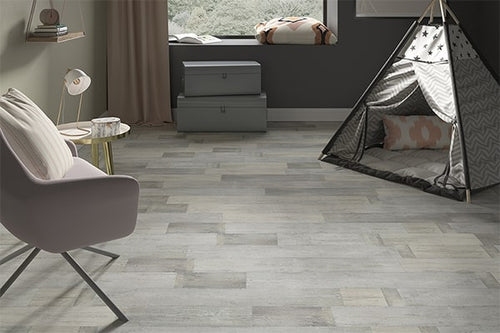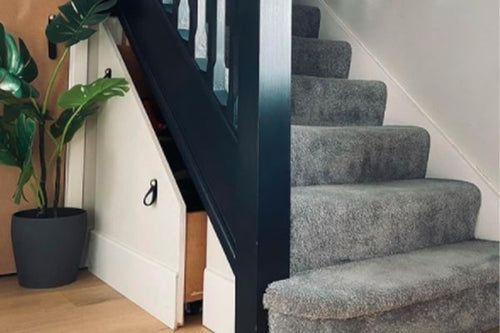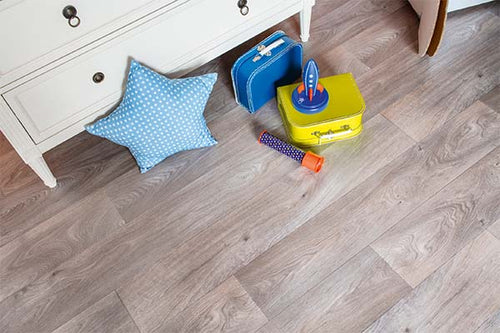When it comes to getting a new floor for your home you will always find yourself with questions. Vinyl flooring comes with all the practicalities and advantages of modern flooring while still delivering the sought-after natural look, but you will understandably want to know more about it before making it a part of your home.
Luckily, you're not alone. Many people before you have asked the same questions you are asking now, and that's why we've made sure to have the answers to the nine most common vinyl flooring questions you could be asking. If you want to know anything that's not covered here, our friendly flooring experts are just a phone call away on 02476 012 840.
1 - What is vinyl flooring?


Vinyl flooring comes in three main types - luxury vinyl, luxury rigid core vinyl, and sheet vinyl (sometimes called loose lay vinyl). Each type has unique features that make them advantageous in different parts of your home. All of them are generally easy to clean, waterproof or water-resistant, and feature printed décor layers to provide an authentic look.
You can learn more about vinyl flooring from our 'What is Vinyl Flooring?' blog in our Advice Centre, where you can also find out why you should choose sheet vinyl flooring and luxury rigid core vinyl flooring.
2 - How to lay vinyl flooring
There are three methods to lay vinyl flooring, and which ones you can use depends on the type of vinyl floor you want to install. The first is glue down, which is used for certain types of luxury vinyl and can be used for sheet vinyl. Vinyl floors installed this way do not require underlay as it is bonded directly on to the subfloor with an adhesive to maximise durability. When fitting a floor this way, we recommend hiring a professional to do the job.
The second method is click system fitting, found in rigid core vinyl and some luxury vinyl. This is an Easy DIY option done over underlay where the boards are floated and locked in together. The last method is loose lay, exclusive to sheet vinyl. No glue or other fittings are needed but it can only be done up to a certain m2 in a low traffic area of your home.


If you want to learn more about how to lay any type of vinyl flooring, we have a full blog on how to install vinyl flooring in our Advice Centre.
3 - How to clean vinyl floors
Luxury vinyl floors are easy to clean and maintain thanks to their tough, scratch-resistant top layer. Their low maintenance nature makes them the perfect worry-free floor and cleaning them only takes a quick sweep, vacuum, or mop. Luxury vinyl is 100% waterproof and can bounce back from most spills and stains with ease but be sure never to use abrasive scourers to avoid causing surface damage. Rigid core vinyl can be steam cleaned if you want to give your floor a facelift.


Be sure to check out our recommended after care range for vinyl flooring and read more of our tips on how to maintain vinyl flooring so you know you're getting the best performance out of your floor.
4 - Can you paint vinyl flooring?
While it is possible to paint over a vinyl floor, it is not recommended you does so. Vinyl flooring's surface does not accept paint well and is likely to hold some degree of dirt and staining which will further inhibit paint bonding. Even if you use porch and floor paint that's made to hold up to foot traffic, you will still find it is susceptible to scuffs, scratches, and chipping.
If your floor is in need of a refresh, then use our Shop by Colour tool to help find a vinyl floor with the look you want.
5 - How to cut vinyl flooring
Vinyl flooring is designed to be easy to cut for a fuss-free fitting, and does not require the same type of equipment you might use for real wood and laminate. To cut luxury vinyl you can just score the plank or tile with a utility knife and then snap it off. You can use a laminate cutter to make the cuts just as well, which you may find easier for trimming smaller sections, and scissors can be used to trim sheet vinyl; depending on it's thickness.
6 - Do you need underlay for vinyl flooring?
You will need underlay to lay click vinyl flooring, as it forms a protective barrier between the subfloor and the vinyl floating on top of it. There are different types of underlay that each provide different benefits, so make sure you're choosing the right one for your floor.
With glue down vinyl and sheet vinyl you will not need underlay.


7 - Is vinyl flooring good?
As with any flooring, how good it is comes down to what you are using it for. Luxury vinyl flooring is a very good choice in bathrooms and kitchens thanks to its easy to clean surface and waterproofing, making it more than a match for all of the spills and splashes that come from busy homes. Rigid core vinyl is a great option for conservatories as it can withstand surface temperatures up to 60 °C, and sheet vinyl is a fantastic choice for children's bedrooms, playrooms, and nurseries thanks to its cushioning and easy-care nature.


Vinyl flooring is a versatile option for all areas of your home, but you may find other floors that better suit your needs in certain rooms, such as soft and comfy carpets for bedrooms and living rooms and laminate or engineered wood for hallways and dining rooms.
8 - Can you lay vinyl flooring over tile?
Luxury vinyl flooring that is fitted by way of a click system is sometimes dubbed as a 'floating' floor, since it is not directly fixed on to the subfloor beneath. Because of this, it is possible to lay vinyl flooring directly over ceramic and porcelain tile provided they are a suitable substitute to the subfloor. This means the floor must not be damaged or dented and the grout lines are not too deep or wide, as this can create slight depressions in the vinyl flooring.
9 - How much is vinyl flooring?
Like with any floor, the cost of vinyl flooring can vary depending on the quality and features of the floor. In general, expect to pay in the range of £11 to £16 per m2 for sheet vinyl, and for the highest quality of luxury rigid core vinyl you can expect up to £40 per m2. Vinyl makes for a great, affordable flooring option, costing less than other floors as it is made from synthetic materials.
While this may be everything you need to feel like a vinyl aficionado, your flooring questions might not stop here - from learning all about accessories to finding the best floor for your kitchen, we have all you'll need to know in our Advice Centre.


